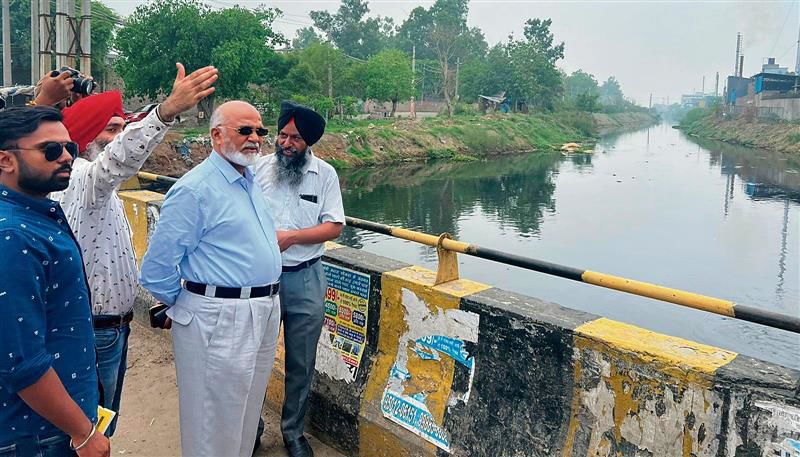ED can intervene in Buddha Dariya, other pollution cases, says ex-official
Ludhiana, July 20
Former deputy director of the Enforcement Directorate (ED) Niranjan Singh today visited the Buddha Dariya here to make an on-the-spot assessment of its pollution.
He was joined by activists from the Naroa Punjab Manch and the public action committee (PAC) running ‘Kale Pani da Morcha’, a campaign against the polluted water of the nullah flowing into the Sutlej.
Seeing the water coming out of the sewage treatment plant of Jamalpur and common effluent treatment plants (CETPs) of 40 and 50 MLD of the dyeing industry, he asked why they were not treating the same before releasing it. When told that it was treated water, he was taken aback.
He said the main purpose of his visit today was to find out why no effective solution had been found for such a long time for the pollution of state’s water bodies, especially the Buddha Dariya and the Sutlej.
He wanted to understand if it was due to some sort of connivance and corruption among the pollution control authorities and polluters, especially those in the industry, and if the ED’s intervention was possible to tackle such corruption.
The former ED official said: “If pollution control board officials or industrialists conspire to pollute rivers or the groundwater, then the ED has the discretion to take action against them under the Prevention of Money Laundering Act. They can be prosecuted as such earnings can be considered proceeds of crime. The ED can also take action against politicians if they are found obstructing officers or industrial owners from doing proper work according to the norms and the law”.
On the occasion, Kuldeep Singh Khaira of the Public Action Committee (Matewara, Sutlej, and Buddha Dariya) said the ED had taken cognisance of the matter and taken action in the case of a liquor factory’s groundwater pollution at Zira, which was dumping its effluents via borewells into the ground.
Jaskirat Singh of the Naroa Punjab Manch said if institutions such as the Punjab Pollution Control Board had failed to do their job in making the Buddha Dariya clean, they would not hesitate to find other institutions that could be more effective in tackling pollution and corruption together to clean rivers and save people from drinking toxic water.
Niranjan Singh said today that he had also met former vice-chancellor of the PAU, Dr Kirpal Singh Aulukh, who had headed the committee that prepared the first report on the Buddha Dariya pollution in 2007. He had obtained a copy of the report and would study it to find out why successive governments could not follow its recommendations and if any of the officers and politicians could be held accountable under law for such a crime against humanity.









